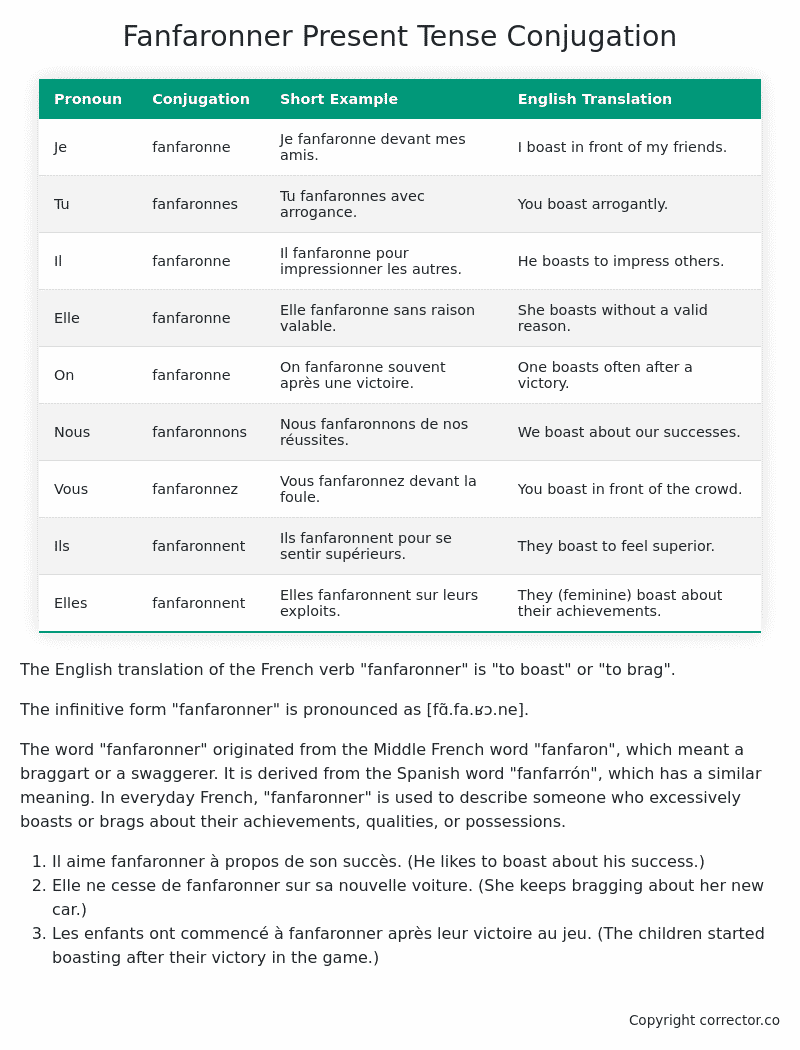Le Present (Present Tense) Conjugation of the French Verb fanfaronner
Introduction to the verb fanfaronner
The English translation of the French verb “fanfaronner” is “to boast” or “to brag”.
The infinitive form “fanfaronner” is pronounced as [fɑ̃.fa.ʁɔ.ne].
The word “fanfaronner” originated from the Middle French word “fanfaron”, which meant a braggart or a swaggerer. It is derived from the Spanish word “fanfarrón”, which has a similar meaning. In everyday French, “fanfaronner” is used to describe someone who excessively boasts or brags about their achievements, qualities, or possessions.
- Il aime fanfaronner à propos de son succès. (He likes to boast about his success.)
- Elle ne cesse de fanfaronner sur sa nouvelle voiture. (She keeps bragging about her new car.)
- Les enfants ont commencé à fanfaronner après leur victoire au jeu. (The children started boasting after their victory in the game.)
Fanfaronner – About the French Present Tense
To take a deep dive into all the French tenses then see our article on Mastering French Tense Conjugation.
Common Everyday Usage Patterns For Le Present
Interactions with Other Tenses
Table of the Present Tense Conjugation of fanfaronner
| Pronoun | Conjugation | Short Example | English Translation |
|---|---|---|---|
| Je | fanfaronne | Je fanfaronne devant mes amis. | I boast in front of my friends. |
| Tu | fanfaronnes | Tu fanfaronnes avec arrogance. | You boast arrogantly. |
| Il | fanfaronne | Il fanfaronne pour impressionner les autres. | He boasts to impress others. |
| Elle | fanfaronne | Elle fanfaronne sans raison valable. | She boasts without a valid reason. |
| On | fanfaronne | On fanfaronne souvent après une victoire. | One boasts often after a victory. |
| Nous | fanfaronnons | Nous fanfaronnons de nos réussites. | We boast about our successes. |
| Vous | fanfaronnez | Vous fanfaronnez devant la foule. | You boast in front of the crowd. |
| Ils | fanfaronnent | Ils fanfaronnent pour se sentir supérieurs. | They boast to feel superior. |
| Elles | fanfaronnent | Elles fanfaronnent sur leurs exploits. | They (feminine) boast about their achievements. |
Other Conjugations for Fanfaronner.
Le Present (Present Tense) Conjugation of the French Verb fanfaronner (You’re reading it right now!)
Imparfait (Imperfect) Tense Conjugation of the French Verb fanfaronner
Passé Simple (Simple Past) Tense Conjugation of the French Verb fanfaronner
Passé Composé (Present Perfect) Tense Conjugation of the French Verb fanfaronner
Futur Simple (Simple Future) Tense Conjugation of the French Verb fanfaronner
Futur Proche (Near Future) Tense Conjugation of the French Verb fanfaronner
Plus-que-parfait (Pluperfect) Tense Conjugation of the French Verb fanfaronner
Passé Antérieur (Past Anterior) Tense Conjugation of the French Verb fanfaronner
Futur Antérieur (Future Anterior) Tense Conjugation of the French Verb fanfaronner
Subjonctif Présent (Subjunctive Present) Tense Conjugation of the French Verb fanfaronner
Subjonctif Passé (Subjunctive Past) Tense Conjugation of the French Verb fanfaronner
Subjonctif Imparfait (Subjunctive Imperfect) Tense Conjugation of the French Verb fanfaronner
Conditionnel Présent (Conditional Present) Tense Conjugation of the French Verb fanfaronner
Conditionnel Passé (Conditional Past) Tense Conjugation of the French Verb fanfaronner
Conditionnel Passé II (Conditional Past II) Tense Conjugation of the French Verb fanfaronner
L’impératif Présent (Imperative Present) Tense Conjugation of the French Verb fanfaronner
L’impératif Passé (Imperative Past) Tense Conjugation of the French Verb fanfaronner
L’infinitif Présent (Infinitive Present) Tense Conjugation of the French Verb fanfaronner
L’infinitif Passé (Infinitive Past) Tense Conjugation of the French Verb fanfaronner
Le Participe Présent (Present Participle) Tense Conjugation of the French Verb fanfaronner
Le Participe Passé (Past Participle) Tense Conjugation of the French Verb fanfaronner
Struggling with French verbs or the language in general? Why not use our free French Grammar Checker – no registration required!
Get a FREE Download Study Sheet of this Conjugation 🔥
Simply right click the image below, click “save image” and get your free reference for the fanfaronner present tense conjugation!

I hope you enjoyed this article on the verb fanfaronner. Still in a learning mood? Check out another TOTALLY random French verb present conjugation!


